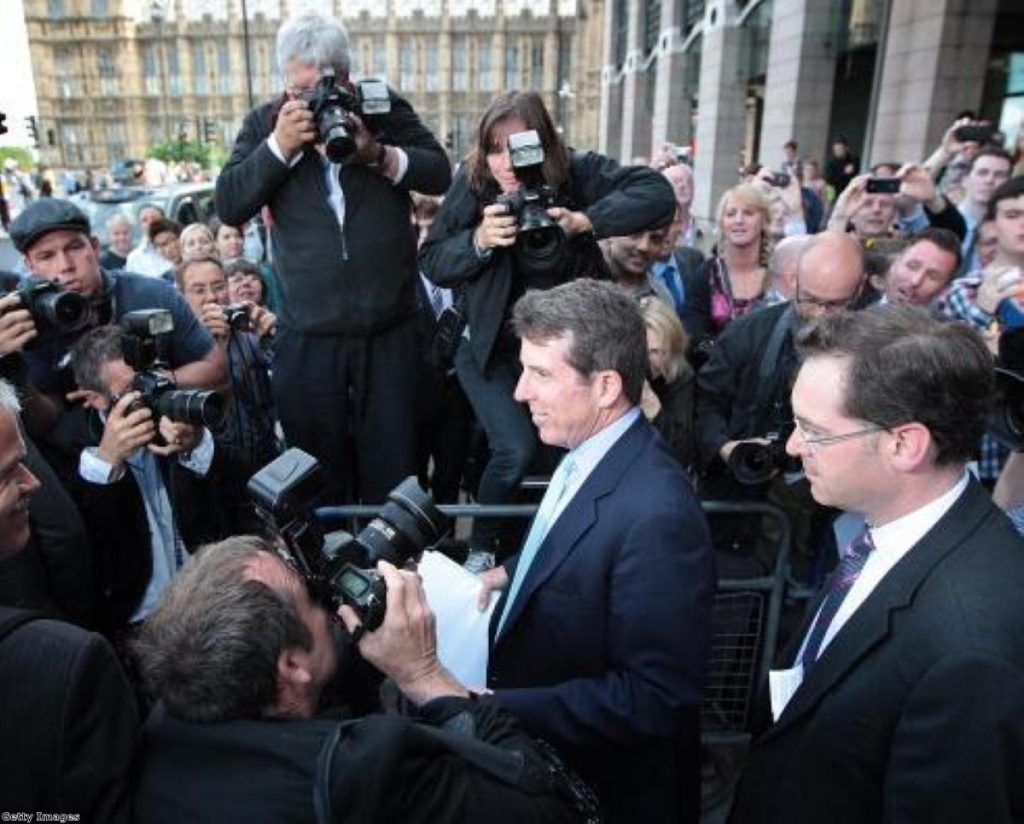Sketch: Bob hearts Barclays, but MPs don’t give Diamond much love
"Why are you so reluctant to tell us?" Andrew Tyrie asked Bob Diamond at the start of today's Treasury committee grilling. "I'm very suspicious," Tory Mark Garnier declared, three hours later. Nothing much emerged in the interim.
By the end of those three hours brains in the crowded committee room had turned to a dull sludge. Politicos are not entirely au fait with the intricacies of Libor at the best of times, and after an afternoon of detailed questioning much of it became blurred and confusing. This was a triumph for Diamond, whose refusal to engage in any kind of detail simply stymied frustrated MPs.
For a man who was supposed to be Public Enemy of the Week, Diamond looked remarkably smooth. He is very American, whether calling former minister Shruti Vedera "Shrew-dy", repeatedly declaring his love for "amazing" Barclays, or calling the MPs questioning him by their first name. None of them dared to correct him on the latter. Sometimes it got very confusing. "My first reaction was 'John, you have to get to Whitehall'…" and "What he was trying to tell me was, 'Bob, …'" Etc etc. You get the picture.
Except you don't, do you? By the time the session finished we were none the wiser as to what had actually gone on at Barclays. MPs on the Treasury committee were obviously psyched up for the occasion during the opening phases. It took about 15 minutes before any of them dared change their facial expressions from the default frown. When that happened it was the veteran Tory Michael Fallon, who allowed an incredulous smile to spread across his face. He had realised before all the others what was happening here: a stonewalling performance of the highest order.
John Thurso, the bearded Liberal Democrat ex-peer (honestly), put it another way. "If you were an English cricketer I think you would be Geoffrey Boycott – in occupying the crease for two hours I'm not sure we're any further forward." This was the only real moment when Diamond appeared fazed. He obviously didn't have a clue what Thurso was talking about. But, like all cricket analogies, this one was sound. Diamond had blocked his way through an entire session like the best of England's openers. He refused to budge an inch.
The key to his strategy was consistency. As he explained repeatedly, he was sorry for what had happened – but made clear he hadn't known anything about it at the time. Diamond waxed lyrical on this point. He thought the behaviour of traders who had fiddled the interbank lending rate Libor was "reprehensible" and "wrong". He was "sorry". He felt "disappointed", "angry" and even "physically ill". There was "absolutely no excuse".
And yet, although he took responsibility for all this, he did not accept "culpability". When John Mann put the Quaker principles on which Barclays had been founded to him – honesty, integrity and plain dealing, Diamond insisted: "That's how I've behaved for my entire career in business." Those jaws which were not already on the floor proceeded to do so. This was a man who simply would not budge.
In their own ways each MP tried their hardest to get him to give way. Mann's booming attack on Diamond, delivered at approximately three times the volume of anyone else in the room all afternoon, was one of a number of valiant efforts. Andrea Leadsom ripped into Diamond, suggesting that he lived in a "parallel universe" and getting him to concede he wouldn't "stand in the way" of criminal investigations. Labour's George Mudie told him his defence "doesn't wash". David Ruffley kept charging in with some frustrated questioning. "You've been through the mill!" he yelled. "It's reprehensible behaviour," Diamond replied, for the 87th time.
All of this induced a sense of fevered desperation to those in the room by the end of the three hours. There was something about Diamond's manner which seemed to ooze confidence. He appeared to be a man who could get away with anything. Which, of course, is exactly what MPs suspect him of doing.
Diamond even erased awkward statements he had just made with the whole world watching. "Sorry, I can give a better answer!" he offered helpfully. And again, when asked about whether there was a particular piece of evidence among Barclays' files: "Not that we've located. (pause) That sounded unusual. Not that we know of."
Perhaps he went too far. All that first-name calling and informality seemed to suggest he wasn't taking this seriously enough. When Garnier praised his work at Barclays Capital, Diamond was obviously grateful. "Just looking for some love," he joked. Mann offered him "some love" a little later by suggesting to him that he might want to give up his £20 million bonus. Diamond dodged that one, just like he had dodged all the other questions, too.
Those of us wanting answers as a result of this session were left sorely disappointed. MPs will spend tomorrow debating whether politicians or a judge should examine the conscience of the banking sector in the months to come. After today's banging-head-on-a-brick-wall experience, let's hope whatever they eventually decide on has the teeth to get further than the zilch progress made today.





-01.png)